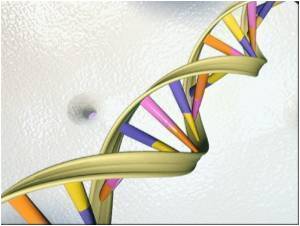
Lopinavir-ritonavir is licensed in the United States for HIV-infected newborns older than 14 days and in Europe for children older than 2 years. However, published data concerning its use in newborns are scarce. In April 2010, one of the centers of the French national screening program for congenital adrenal hyperplasia (CAH; a group of inherited disorders of the adrenal glands) identified a transient increase of 17-hydroxyprogesterone (17OHP; a steroid hormone produced mainly by the adrenal glands) in dried blood spots from 2 children treated at birth with lopinavir-ritonavir.
Albane Simon, M.D., of the Hopital Necker-Enfants Maiades, Assistance Publique-Hopitaux de Paris, France, and colleagues conducted a study to assess whether immediate postnatal exposure to lopinavir-ritonavir was associated with changes in adrenal function compared with standard prophylactic zidovudine treatment. The study included information from the database of the national screening for congenital adrenal hyperplasia and the French Perinatal Cohort, with a comparison of HIV-1-uninfected newborns postnatally treated with lopinavir-ritonavir and controls treated with standard zidovudine. There was an assessment of levels of 17OHP and dehydroepiandrosterone-sulfate (DHEA-S; the circulating form of a steroid produced primarily by the adrenal cortex) concentrations during the first week of treatment.
Among mother-child pairs in the Paris area enrolled in the study cohort between December 2004 and September 2008, the authors evaluated 50 HIV-1 uninfected children who received lopinavir-ritonavir just after birth, and 108 who received standard prophylaxis: zidovudine alone (n= 100), zidovudine and lamivudine (n = 6), or zidovudine and nevirapine (n = 2). Among the 50 newborns treated with lopinavir-ritonavir, 7 (14 percent) had abnormally high 17OHP results from dried blood spots (greater than 16.5 ng/mL at term or greater than 23.1 ng/mL preterm) vs. 0 of 108 controls. For children born at term, 5 of 42 newborns treated with lopinavir-ritonavir vs. 0 of 93 controls had values greater than 16.5 ng/mL.
The median (midpoint) 17OHP value for term newborns treated with lopinavir-ritonavir was 9.9 ng/mL vs. 3.7 ng/mL in controls. The difference observed in median 17OHP values between treated newborns and controls was higher in children also exposed in utero (11.5 ng/mL vs. 3.7 ng/mL) than not exposed in utero (6.9 ng/mL vs. 3.3 ng/mL). The median DHEA-S values for children born at term were 9,242 ng/mL for the treated group vs. 484 ng/mL for the controls. Consistent with the findings for 17OHP, the DHEA-S values were significantly higher only in cases also exposed in utero to ritonavir-boosted protease inhibitor.
Advertisement
"In summary, our findings of the association between lopinavir-ritonavir and transient adrenal dysfunction in HIV-1 uninfected newborns suggest that lopinavir-ritonavir and more generally ritonavir boosting should be used with caution, if at all, in premature infants, and if this drug regimen is administered to full-term infants, it should be used under electrolyte monitoring. Whether more prolonged exposure of HIV-1 -infected or uninfected infants via breast milk is associated with endocrine disruption should be carefully investigated, and the apparent risk associated with prenatal ritonavir exposure also merits further evaluation."
Advertisement














